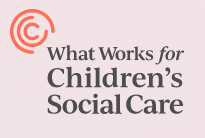Supervising Designated Safeguarding Leads in Primary Schools
This study aims to establish the impact of providing a designated social worker to supervise Designated Safeguarding Leads (DSLs) in primary schools. DSLs are responsible for child protection and safeguarding in schools. The role of a DSL can involve making dificult decisions about vulnerable children in often complex circumstances.
 Pub. Date
Pub. Date
27 April, 2023
 Pub. Type
Pub. Type

Main points
- The impact evaluation did not find that the programme had a statistically significant impact on the primary outcome of contacts resulting in no further action. The analysis points to a lower rate of contacts leading to no further action (NFA) among treatment schools, but not to a statistically significant extent. The magnitude of this efect is smaller than the trial was designed to efect, and so an efect of this size would not have been found to be statistically significant. The estimated efect of -0.06 (95% confidence interval (CI) [-0.15; 03]), while statistically insignificant, would be equivalent to a diference between treatment and control groups of about 0.33 NFA contacts per school. In an LA with 120 primary schools, this would be equivalent to a diference of about 40 NFA contacts per LA
- A number of sensitivity analyses were conducted in relation to the primary outcome; but the main result remains robust to these additional analyses. In addition, the findings did not suggest evidence of an impact in the latter period of the intervention, and no differences in effectiveness were apparent between schools located in urban and rural areas
- Analysis of secondary outcomes relating to contacts and referrals also showed no statistically significant differences between schools allocated to receive the programme and those that were not. Thus we observe no impact of the programme on total contacts made by schools, new referrals originating from schools or referrals resulting in no further action (all measured as a proportion of pupils)
- Effects on DSL wellbeing were considered using two scale measures: job-related anxiety–contentment and job-related depression–enthusiasm. The impact evaluation did not find a statistically significant impact on either measure
- 70% of schools in the treatment group had at least one supervision session, while 30% did not have any sessions. The reasons for lack of take-up included: schools participating in other support programmes and feeling they did not need support, lack of time and concerns that supervision was a way of monitoring schools. When supervisors managed to organise the first session to introduce the programme properly to schools, they most often maintained engagement throughout the programme
- Apart from the lower than anticipated take-up and slow start to delivery and recruitment, the IPE found that the programme (when taken up by schools) was delivered largely as intended, and that the programme model itself would not require changes to be rolled out on a larger scale. DSLs expressed support for potential wider rollout
- DSLs interviewed found the supervision sessions useful, including having the time for reflection, developing new ideas, discussing complex cases or new types of cases, being signposted by the SSW to useful resources or local support organisations, learning from a social worker’s perspective and discussing their own wellbeing
- There were mixed findings on perceived impacts. Many DSLs interviewed reported that supervision had no impact on their practices, because they were already confident in their ability to perform the role and their knowledge, including about thresholds that applied for children’s social care referrals. At the same time, many DSLs described positive impacts, particularly in relation to improving confidence in the role and their emotional wellbeing
- The cost of the intervention is estimated at around £850 per school, per school year. This cost is based primarily on the cost of employing a SSW; although this is the most substantive element of expenditure, it is likely to underestimate the full cost of programme delivery because it does not include, for example, training or support for the SSW.

Funders













